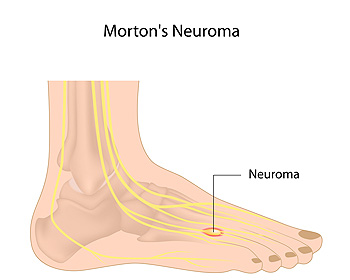 Nerve tissue is often affected due to Morton’s neuroma. Growths can form on the tissue, and may cause pressure, pain, and discomfort. Many patients liken the sensation to having a pebble in the shoe, and some people feel a burning or numbing sensation. This condition can develop from repetitive overuse while performing specific sporting activities, or it may come from wearing shoes that do not fit correctly. Additionally, people who have hammertoes, bunions, or flat feet may be prone to developing Morton’s neuroma. Prompt treatment should begin in order to lessen existing pain. It is important to have a proper diagnosis made, which is generally done by having an X-ray, ultrasound, or MRI performed. Relief can be found when shoes that are worn fit properly, in addition to wearing custom made orthotics. There are several treatment options available for Morton’s neuroma, and it is suggested that you consult with a podiatrist who can determine what the best one is for you.
Nerve tissue is often affected due to Morton’s neuroma. Growths can form on the tissue, and may cause pressure, pain, and discomfort. Many patients liken the sensation to having a pebble in the shoe, and some people feel a burning or numbing sensation. This condition can develop from repetitive overuse while performing specific sporting activities, or it may come from wearing shoes that do not fit correctly. Additionally, people who have hammertoes, bunions, or flat feet may be prone to developing Morton’s neuroma. Prompt treatment should begin in order to lessen existing pain. It is important to have a proper diagnosis made, which is generally done by having an X-ray, ultrasound, or MRI performed. Relief can be found when shoes that are worn fit properly, in addition to wearing custom made orthotics. There are several treatment options available for Morton’s neuroma, and it is suggested that you consult with a podiatrist who can determine what the best one is for you.
Morton’s neuroma is a very uncomfortable condition to live with. If you think you have Morton’s neuroma, contact one of our podiatrists of New York Foot and Ankle. Our doctors will attend to all of your foot care needs and answer any of your related questions.
Morton’s Neuroma
Morton's neuroma is a painful foot condition that commonly affects the areas between the second and third or third and fourth toe, although other areas of the foot are also susceptible. Morton’s neuroma is caused by an inflamed nerve in the foot that is being squeezed and aggravated by surrounding bones.
What Increases the Chances of Having Morton’s Neuroma?
- Ill-fitting high heels or shoes that add pressure to the toe or foot
- Jogging, running or any sport that involves constant impact to the foot
- Flat feet, bunions, and any other foot deformities
Morton’s neuroma is a very treatable condition. Orthotics and shoe inserts can often be used to alleviate the pain on the forefront of the feet. In more severe cases, corticosteroids can also be prescribed. In order to figure out the best treatment for your neuroma, it’s recommended to seek the care of a podiatrist who can diagnose your condition and provide different treatment options.
If you have any questions, please feel free to contact one of our offices located in Franklin Square, Bethpage, Brooklyn, and Massapequa, NY . We offer the newest diagnostic and treatment technologies for all your foot care needs.
